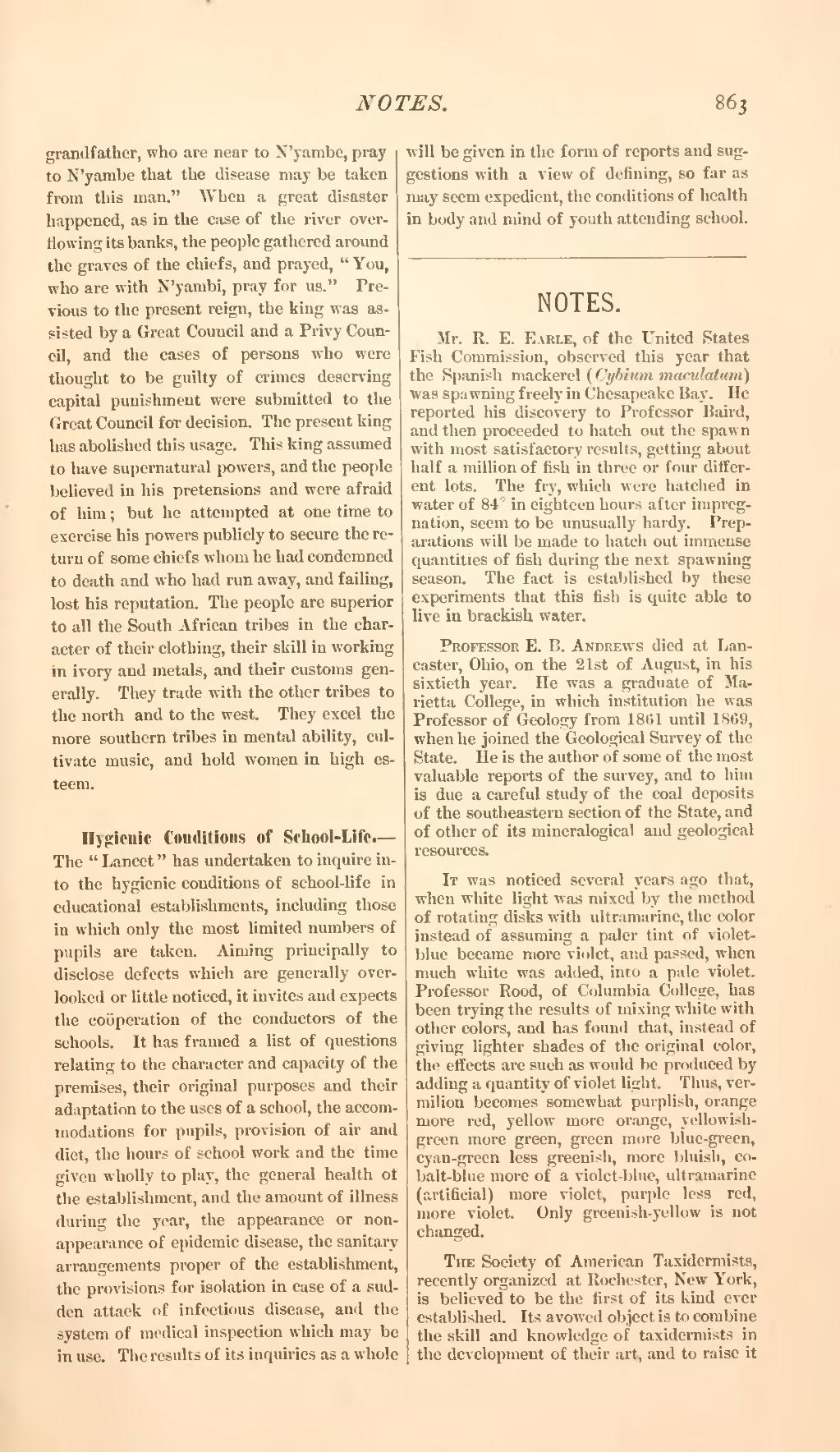grandfather, who are near to N'yambe, pray to N'yambe that the disease may be taken from this man." When a great disaster happened, as in the case of the river over-flowing its banks, the people gathered around the graves of the chiefs, and prayed, "You, who are with N'yambi, pray for us." Previous to the present reign, the king was assisted by a Great Council and a Privy Council, and the cases of persons who were thought to be guilty of crimes deserving capital punishment were submitted to the Great Council for decision. The present king has abolished this usage. This king assumed to have supernatural powers, and the people believed in his pretensions and were afraid of him; but he attempted at one time to exercise his powers publicly to secure the return of some chiefs whom he had condemned to death and who had run away, and failing, lost his reputation. The people are superior to all the South African tribes in the character of their clothing, their skill in working in ivory and metals, and their customs generally. They trade with the other tribes to the north and to the west. They excel the more southern tribes in mental ability, cultivate music, and hold women in high esteem.
Hygienic Conditions of School-Life.—The "Lancet" has undertaken to inquire into the hygienic conditions of school-life in educational establishments, including those in which only the most limited numbers of pupils are taken. Aiming principally to disclose defects which are generally over-looked or little noticed, it invites and expects the coöperation of the conductors of the schools. It has framed a list of questions relating to the character and capacity of the premises, their original purposes and their adaptation to the uses of a school, the accommodations for pupils, provision of air and diet, the hours of school work and the time given wholly to play, the general health of the establishment, and the amount of illness during the year, the appearance or non-appearance of epidemic disease, the sanitary arrangements proper of the establishment, the provisions for isolation in case of a sudden attack of infectious disease, and the system of medical inspection which may be in use. The results of its inquiries as a whole will be given in the form of reports and suggestions with a view of defining, so far as may seem expedient, the conditions of health in body and mind of youth attending school.
Mr. R. E. Earle, of the United States Fish Commission, observed this year that the Spanish mackerel (Cybium maculatum) was spawning freely in Chesapeake Bay. He reported his discovery to Professor Baird, and then proceeded to hatch out the spawn with most satisfactory results, getting about half a million of fish in three or four different lots. The fry, which were hatched in water of 84° in eighteen hours after impregnation, seem to be unusually hardy. Preparations will be made to hatch out immense quantities of fish during the next spawning season. The fact is established by these experiments that this fish is quite able to live in brackish water.
Professor E. B. Andrews died at Lancaster, Ohio, on the 21st of August, in his sixtieth year. He was a graduate of Marietta College, in which institution he was Professor of Geology from 1861 until 1869, when he joined the Geological Survey of the State. He is the author of some of the most valuable reports of the survey, and to him is due a careful study of the coal deposits of the southeastern section of the State, and of other of its mineralogical and geological resources.
It was noticed several years ago that, when white light was mixed by the method of rotating disks with ultramarine, the color instead of assuming a paler tint of violet-blue became more violet, and passed, when much white was added, into a pale violet. Professor Rood, of Columbia College, has been trying the results of mixing white with other colors, and has found that, instead of giving lighter shades of the original color, the effects are such as would be produced by adding a quantity of violet light. Thus, vermilion becomes somewhat purplish, orange more red, yellow more orange, yellowish-green more green, green more blue-green, cyan-green less greenish, more bluish, cobalt-blue more of a violet-blue, ultramarine (artificial) more violet, purple less red, more violet. Only greenish-yellow is not changed.
The Society of American Taxidermists, recently organized at Rochester, New York, is believed to be the first of its kind ever established. Its avowed object is to combine the skill and knowledge of taxidermists in the development of their art, and to raise it

